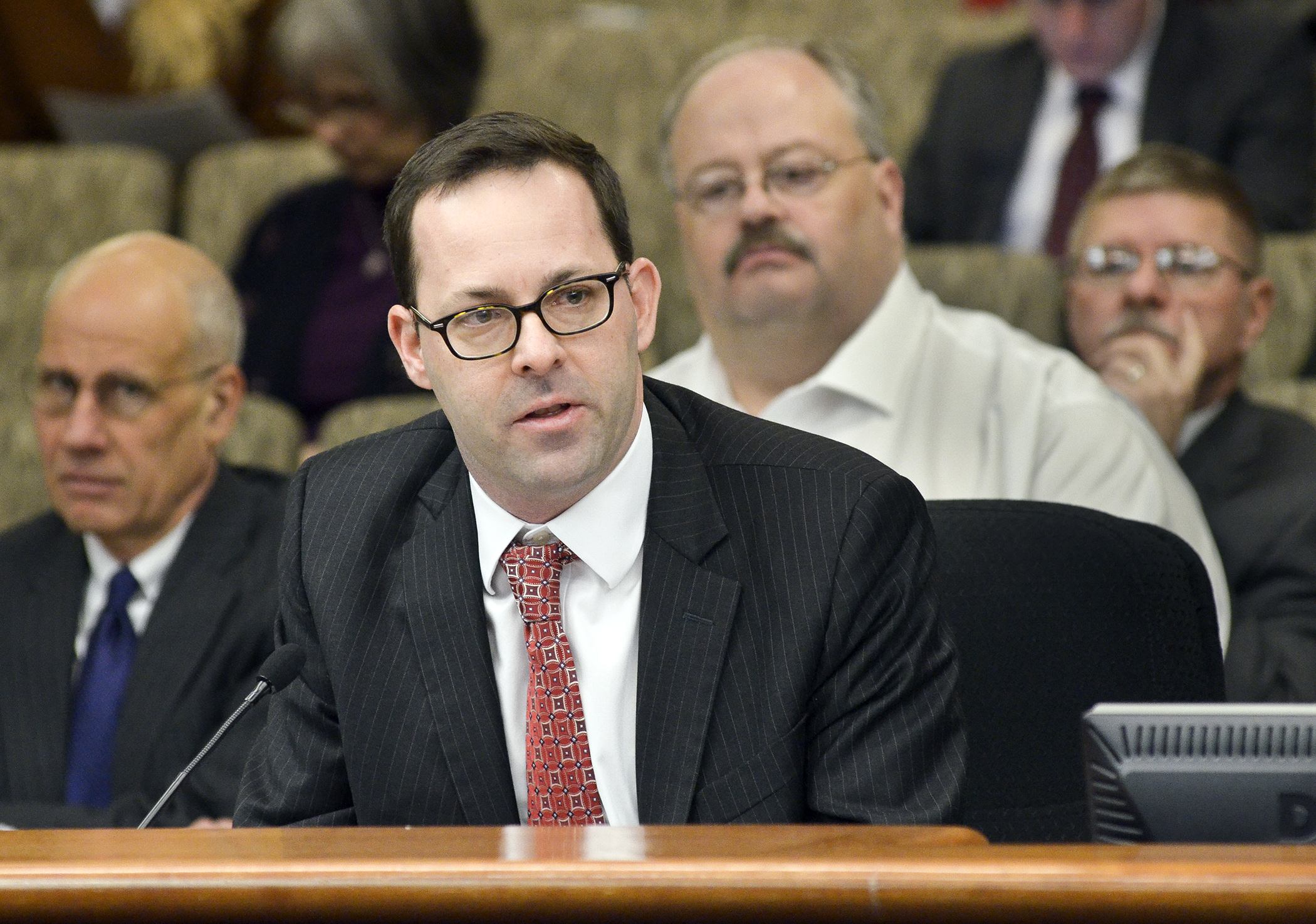Weighing the pros and cons of taxing Social Security income

Should Minnesota phase out the taxing of Social Security income?
That’s the question posed Wednesday to the House Aging and Long-Term Care Policy Committee, where members compared five bills that would do that.
All five bills, with different sponsors and various methods of eliminating the tax, were approved by the committee and referred to the House Taxes Committee. No one proposal was favored by members over the other. Rather, they debated the merits of joining a large majority of other states who have eliminated or lowered Social Security income taxes.
Minnesota is one of seven states that still taxes Social Security income to the fullest extent. Supporting the proposals were representatives of AARP and the Taxpayers League of Minnesota.
Eliminating the tax would give seniors more income to live independently in their communities for longer periods, according to Will Phillips, AARP Minnesota state director.
“When you are retired, it’s tough to increase your income,” Phillips said.
Recipients could earn, on average, $600 a year more in their Social Security benefits if the phase-in periods were fully implemented, according to Joel Michael from the nonpartisan House Research Department. Some would see more, and others would see less depending upon their lifetime earnings and based on an estimated 650,000 state residents over age 65.
Barb Linert of Eagan is one of those fast approaching retirement.
Her financial advisor suggested that she and her husband move to a state that doesn’t tax Social Security income. The couple has adult children in Texas and North Dakota, states that don’t tax Social Security. However, they want to stay in Minnesota, where they also have an adult child and a grandchild with disabilities, for whom they have started a trust fund. Linert said they could pay as much as $50,000 in Social Security income taxes, money that could go toward their granddaughter’s trust fund.
“Please give us an excuse to stay in our state in the autumn of our lives,” she said.
Why eliminate the tax?
In September 2014 Kiplinger Magazine named Minnesota the fourth least-tax-friendly state for retirees.
“We believe that [the bills] are important to the competitiveness of Minnesota,” said former Sen. Ted Lillie, who is now president of the Taxpayers League of Minnesota. The tax climate for retirees needs to be brought in line with surrounding states in order to keep them from moving out of the state, shifting their property and sales taxes to their new state, he added.
Legislators said they heard similar reasons from constituents while door-knocking on the campaign trail. Some constituents count their Minnesota residence as their “vacation home” and live in a second home more than half the year to avoid paying Minnesota taxes.
“Word on the street is, don’t retire in Minnesota. Don’t die in Minnesota,” said Rep. Kathy Lohmer (R-Stillwater), who sponsors one of the bills.
Members agreed there are a multitude of reasons why retirees choose to stay, leave or move into the state, such as grandchildren or voting rights.
“I would suggest that climate has as much to do with it,” said Rep. Jerry Newton (DFL-Coon Rapids).
“It’s not always about taxes,” said Rep. Sandra Masin (DFL-Eagan). “If we want to be more competitive we need to fund transportation [for seniors].”
How the state would be impacted
An exodus of baby boomers could leave a toll on the state’s economy, as well as have social and educational implications.
According to a March 2013 report by the State Demographic Center, “As a large share of our state’s workers retire, it would be wise to develop new pathways for these workers to continue using their talent, either informally or formally. Consulting, part-time, and volunteer opportunities for retirees may help mitigate growing skill mismatches, while providing mutual benefits (health and social benefits to retirees and gifts of knowledge and service to the people with whom they engage).”
This is especially true in rural areas, said Rep. Bob Gunther (R-Fairmont).
But is the tax-free incentive enough to keep retirees here compared to lost tax revenue when they leave? If Social Security recipients kept more of their income, the state would likely see a $40 million reduction in tax revenue the first year and $87 million the second year. As the projected number of retirees increases through 2020, the amount of reduced revenue could be expected to rise accordingly.
Rep. Tina Liebling (DFL-Rochester) said that could shift more of the tax burden onto younger taxpayers.
“We have a very good quality of life here and I think all of us know that doesn’t come free,” said Liebling.
“If we don’t make our seniors pay taxes on their money, if something about being old means you shouldn’t pay, regardless of your income, then somebody else has to pay so we can continue to provide that level of services for those seniors.”
Bill comparisons
Three methods for doing away with the tax are proposed. Total elimination would be phased in over five, eight or 10 years. Two would lower the tax 10 percent annually for 10 years, beginning with the 2015 tax year. Two other bills would take a more aggressive approach and lower the tax 20 percent annually in half the time, completing the phase-in four years sooner. The fifth one would raise percentages of the tax reduction each year over an eight-year period, beginning with the 2015 tax year.
Rep. Greg Davids (R-Preston), chair of the House Taxes Committee, sponsors two of the proposals, but he appreciates all five being forwarded to his committee for further vetting.
More than $8 billion in tax-related bills have been heard in his committee, he said. “We are way over. The tax committee will make those decisions, but I want to hear all ideas.”
The bills, their sponsors and accompanying Senate bills are:
- HF300, sponsored by Lohmer, would reduce the tax by 10 percent a year for 10 years beginning with the 2015 tax year. SF256, a companion sponsored by Sen. Warren Limmer (R-Maple Grove), was laid over by the Senate Taxes Committee;
- HF304, sponsored by Rep. Dale Lueck (R-Aitkin), would reduce the tax by 20 percent a year for five years beginning with the 2016 tax year. SF254, a companion sponsored by Sen. Carrie Ruud (R-Breezy Point), was laid over by the Senate Taxes Committee;
- HF308, sponsored by Davids, is the same as Lohmer’s bill. SF123, a companion sponsored by Sen. David Senjem (R-Rochester), was laid over by the Senate Taxes Committee.
- HF309, which Davids also sponsors, would increase the percentage of the tax reduction each year over an eight-year phase-in period, beginning with the 2015 tax year. SF124, a companion sponsored by Senjem was laid over by the Senate Taxes Committee.
- HF746 is sponsored by Rep. Joe Atkins (DFL-Inver Grove Heights) and is the same as Lueck’s bill. Sen. James Metzen (DFL-South St. Paul) sponsors SF732, a companion that awaits action by the Senate Taxes Committee.
Related Articles
Search Session Daily
Advanced Search OptionsPriority Dailies
Ways and Means Committee OKs proposed $512 million supplemental budget on party-line vote
By Mike Cook Meeting more needs or fiscal irresponsibility is one way to sum up the differences among the two parties on a supplemental spending package a year after a $72 billion state budg...
Meeting more needs or fiscal irresponsibility is one way to sum up the differences among the two parties on a supplemental spending package a year after a $72 billion state budg...
Minnesota’s projected budget surplus balloons to $3.7 billion, but fiscal pressure still looms
By Rob Hubbard Just as Minnesota has experienced a warmer winter than usual, so has the state’s budget outlook warmed over the past few months.
On Thursday, Minnesota Management and Budget...
Just as Minnesota has experienced a warmer winter than usual, so has the state’s budget outlook warmed over the past few months.
On Thursday, Minnesota Management and Budget...

